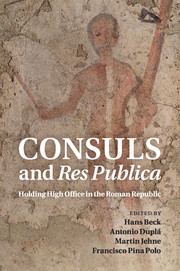Book contents
- Frontmatter
- Contents
- Preface
- Contributors
- The republic and its highest office: some introductory remarks on the Roman consulate
- Part I The creation of the consulship
- Part II Powers and functions of the consulship
- Part III Symbols, models, self-representation
- Chapter 8 The Roman republic as theatre of power: the consuls as leading actors
- Chapter 9 The consul(ar) as exemplum: Fabius Cunctator's paradoxical glory
- Chapter 10 The rise of the consular as a social type in the third and second centuries bc
- Chapter 11 Privata hospitia, beneficia publica? Consul(ar)s, local elite and Roman rule in Italy
- Part IV Ideology, confrontation and the end of the republican consulship
- Bibliography
- Index of persons
- Subject index
Chapter 9 - The consul(ar) as exemplum: Fabius Cunctator's paradoxical glory
from Part III - Symbols, models, self-representation
Published online by Cambridge University Press: 07 September 2011
- Frontmatter
- Contents
- Preface
- Contributors
- The republic and its highest office: some introductory remarks on the Roman consulate
- Part I The creation of the consulship
- Part II Powers and functions of the consulship
- Part III Symbols, models, self-representation
- Chapter 8 The Roman republic as theatre of power: the consuls as leading actors
- Chapter 9 The consul(ar) as exemplum: Fabius Cunctator's paradoxical glory
- Chapter 10 The rise of the consular as a social type in the third and second centuries bc
- Chapter 11 Privata hospitia, beneficia publica? Consul(ar)s, local elite and Roman rule in Italy
- Part IV Ideology, confrontation and the end of the republican consulship
- Bibliography
- Index of persons
- Subject index
Summary
Introduction
Unus homo nobis cunctando restituit rem.
Noenum rumores ponebat ante salutem.
Ergo postque magisque viri nunc gloria claret.
Ennius, Annales fr. 363–5 Skutsch
One person, by delaying, restored the commonwealth for us.
He did not set people's criticisms (sc. of him) before safety.
Therefore it is afterward, and more, that the hero's glory now shines out.
These three hexameter verses, composed probably in the 170s or early 160s bc, come from Ennius’ historical epic, the Annales. They constitute the earliest surviving reference to Q. Fabius Maximus Verrucosus “Cunctator,” one of the leading Roman politicians and generals of the Second Punic War. This description of Fabius was among the best-known passages of Ennius’ poem in antiquity, to judge from the frequency with which later authors quote or allude to it. Its earliest such appearance dates to 59 bc, when Cicero quotes the first verse in a way that shows it was already proverbial; Cicero also quotes all three verses in a pair of texts dating to 44 bc – our only sources for the entire set. In subsequent authors there are numerous further quotations, paraphrases, or echoes of the first or second verse. Scholars have observed that these verses are already in the business of mythmaking, of manufacturing Fabius and his strategy of “delay” as an exemplum for subsequent Roman aristocrats. For the speaker of these verses places Fabius’ “delaying” in the past, and compares its reception by Fabius’ contemporaries with its reception in later eras. The second verse, in particular, hints at a conflict of values and evaluation: Fabius pursued safety (salus) and disregarded criticism (rumores), presumably propagated by contemporaries who opposed his approach. The third verse, however, indicates that the later view of Fabius’ deeds was positive: it is “now” (nunc, in the speaker's present time), and “later” (post, after Fabius’ deeds), that the “glory of the hero” (viri…gloria, both words conferring praise) “shines forth the more” (magis…claret). These claims, in turn, explain and corroborate the approbative declaration of the first verse, that Fabius “restored the commonwealth for us,” where nobis indicates the importance of Fabius’ achievement for the speaker and his generation.
- Type
- Chapter
- Information
- Consuls and Res PublicaHolding High Office in the Roman Republic, pp. 182 - 210Publisher: Cambridge University PressPrint publication year: 2011
- 2
- Cited by



